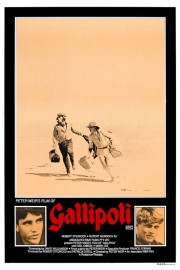Gallipoli
When selecting movies for this year’s “A Movie a Week” series, it felt as though Peter Weir’s “Gallipoli,” made in 1981, would be a good precursor to Christopher Nolan’s “Dunkirk,” set to come out this week. Rewatching it for the first time in many years, and based solely on what I’ve seen in previews for Nolan’s films, I feel like I made the correct choice. Both are about battles with insurmountable odds, and that one is from WWI and the other is from WWII doesn’t mean they don’t have similarities about them. However, Weir’s film is a personal experience rather than a study of the greater picture of the war, and that’s what makes it one of the most distinctive movies of the subject.
One of the things that struck me so much about “Gallipoli” watching it again was how much of the film is very anti-war. The film tells the story about two friends, played by Mark Lee and Mel Gibson, who enlist in the Australian army to go fight for the British Empire during WWI. For Lee’s Archy Hamilton, it feels like a rite-of-passage that is important to him, to do his duty for his country, symbolized by the fact that he lies about his age in order to get in. He is still idealistic about the world he lives in. For Gibson’s Frank Dunne, a former railroad worker, he has no idealized notions of responsibility to his country, especially since it is ultimately not HIS country (it’s Britain) he’s fighting for. However, he still ends up enlisting because he thinks it will be an adventure. While he is older, and more understanding, of the world than Archy, he definitely has a sense of innocence about him when it comes to what war will be like. Both expectations for Archy and Dunne will be shattered when they arrive in Alexandria for the Gallipoli Campaign, and find themselves faced with a reality they never really thought about before heading to the front lines.
Writing this review, I couldn’t help but wonder whether Gibson had this film in mind when he was directing his Oscar-nominated “Hacksaw Ridge.” Both are films about people who feel a duty to their country that pulls them into a life that they aren’t prepared for. The difference is that for Archy and Frank, there is no wiggle room in their higher-up’s view of the duty they must perform- Andrew Garfield’s Desmond Doss was able to find people who would listen to his cause, and allow him to do as he wished, making what he accomplished all the more remarkable. The first two acts of Weir’s film is all set up, introducing Archy and Frank, and how they came to be friends (they’re both long-distance runners), and how they enlisted. They take different paths into the service (Archy is a cavalry member, Frank is in infantry), but they both end up in the same outfit, and it is their running skills that gets them in that position. The last third is on the battlefield, and it’s as harrowing a piece of war filmmaking as anyone has ever put on screen. Lee and Gibson are terrific under Weir’s direction, and it’s a powerful piece of storytelling, and memorable war film that still rates as one of the finest ever made.










